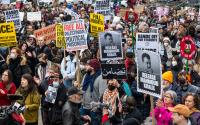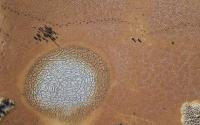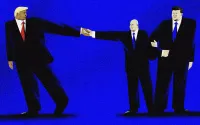15 October 2004
She has been poisoned by men she suspects worked for Russia's secret service and held in a pit in Chechnya for three days by men she knows for certain worked for the successor of the KGB.
But Anna Politkovskaya, Russia's most famous investigative journalist and the most outspoken member of the country's increasingly enfeebled media establishment, has not buckled under the pressure.
Yesterday her most searing critique of the Russian government to date, a book entitled Putin's Russia, was published in the UK. Its contents are likely to send the Kremlin's spin doctors into paroxysms of anger for she paints her main subject, President Vladimir Putin, in a devastating light.
Deploying her legendary blunt prose to great effect, she savages the man she calls "a KGB snoop," and warns that he is moving the country back to a Soviet-style dictatorship. She also does what Moscow has so far miserably failed to achieve: present a roadmap for peace in Chechnya.
At a time when the Russian media is falling over itself to fawn over Mr Putin and sustain a Soviet-style cult of personality around him, her work provides a lone dissenting voice and a voice that cannot be heard in Russia - at least outside the pages of her liberal newspaperNovaya Gazeta.
Politkovskaya does what few other Russian commentators dare and steps over an invisible line, mocking Mr Putin in an intensely personal way; comparing him to Soviet leader Josef Stalin, to a pathetic literary creation of Nikolay Gogol's and to a bland, over-promoted spy who should never have been elevated to the dizzy Kremlin heights. She paints a relentlessly bleak view of the state of Russia today chastising those in the West whom she says the status quo "suits" and, depressingly, holds out little or no hope for improvement.
In a frank interview with The Independent yesterday she said she was fearful for the future of a country she loved, and hoped against the odds that a viable form of democracy might take hold one day.
"Under President Putin we won't be able to forge democracy in Russia and will only turn back to the past. I am not an optimist in this regard and so my book is pessimistic. I have no hope left in my soul. Only a change of leadership would allow me to have hope but it's a political winter. The Kremlin is turning the country back to its Soviet past."
Admitting that her book is staunchly anti-Putin, she claims that the Russian leader rues the day in 1991 when the Soviet Union collapsed and is in the process of rebuilding his own version of the USSR which has already started to seriously impinge upon people's basic freedoms.
"My heroes are those people who want to be individuals but are being forced to be cogs again," she said. "In an Empire there are only cogs."
Describing how Mr Putin has been careful to sideline any viable opponents, she argues, however, that Russia's liberals, thrashed at the ballot box and discredited in the eyes of many Russians, are still a force to be reckoned with. "There are many people in Russia who would be strong leaders," she said. "You might think they have their faults but nothing could be worse than Putin."
Aligning herself strongly with the country's liberal forces, she argues that Russia cannot leave Mr Putin at the helm until 2008 and says that fresh elections need to be held before then.
"Because Putin, a product of the country's murkiest intelligence service, has failed to transcend his origins and stop behaving like a lieutenant-colonel in the KGB. He is still busy sorting out his freedom-loving fellow countrymen; he persists in crushing liberty just as he did earlier in his career."
"We no longer want to be slaves, even if that is what best suits the West. We demand our right to be free." Poking fun at Mr Putin, she compares him to the humble Tsarist clerk, Akaky Akakievich, a famous literary creation of Russian author Nikolay Gogol. The wretched Akakievich believed the key to being successful and popular lay with his expensive overcoat. He was concerned only with his own image but when the overcoat was stolen he discovered that his own soul was empty. Politkovskaya told The Independent: "Putin is like Gogol's Akaky Akakievich. He is a small grey person who really wants not to be grey. Putin had a historic chance to be great and not to be grey but he is still grey."
More dangerously she is convinced that Mr Putin has only contempt for ordinary Russians and democracy. "During the presidential pre-election campaign (this year) he behaved exactly like Stalin. He destroyed the democratic opposition, pulled the wool over people's eyes, refused to even debate and constantly lied about Chechnya and about social reforms. They say we have a happy country but we do not. It is a poor country. Putin doesn't respect people and repression will follow just as it did with Stalin."
Elaborating on a personally harrowing experience earlier this year she describes how men she suspects were Russian secret service agents prevented her from getting to Beslan on 1 September where pro-Chechen extremists were holding some 1,200 hostages in a school. Politkovskaya had played a role in negotiations with Chechen rebels in 2002 during an ultimately tragic hostage situation in a Moscow theatre and felt her neutral status could come in handy once again.
On 1 September she phoned her rebel contacts and pleaded with them to allow Aslan Maskhadov, former Chechen president and rebel leader, to journey to Beslan and persuade the hostage-takers to release their captives. Having agreed to fly to Beslan and negotiate a safe passage for Maskhadov she set off for the airport. "My last contact with Maskhadov's people was ten minutes before I got on the plane. I suppose I did more than a journalist normally does. I then got on the plane and drank some tea and then ... nothing."
Politkovskaya had been poisoned, she said: "I don't remember anything else. I don't know but can surmise what happened. 'They' had decided that I needed to 'be dealt with' though not killed. A decision was taken and a middle-ranking (FSB) officer fulfilled it."
The veteran reporter's voice tightened when asked how she felt the authorities handled the Beslan siege in which 344 people, over half of them children, died. "I didn't see what happened because I was unconscious but I believe the presidential administration, which was pulling all the strings, was cowardly.
"One and a half days passed and nobody went to negotiate with the bandits because the presidential administration opposed such a move. It was a tragedy."
Politkovskaya has had some unpleasant tangles with the authorities in the past. In 2000 her life was threatened by a Russian police officer because she had spoken out about an individual being kidnapped; she was forced into hiding.
In February 2001 there was worse to come. Accused of being a spy for Chechen warlord Shamil Basayev, the man who claims he masterminded Beslan, she was held in a pit for three days by the FSB without food or water.
Chechnya and its complex vortex of hatred and violence have fascinated Politkovskaya since 1999 when she first started reporting from the breakaway region. She has been back countless times since documenting in minute detail the terrible suffering of ordinary Chechens and the state of the demoralised, brutalised Russian forces. She said yesterday she took no sides in the conflict and had no truck with the likes of Basayev whatever the Kremlin may or may not think.
"He (Basayev) asked me to come and interview him once but I refused. After Budennovsk (in 1995 when Chechen rebels took 1,600 people hostage in a hospital in southern Russia) I thought there was nothing to talk about. There are no heroes and no angels in Chechnya. The war there has been going on for so long that there are only people who are interested in continuing it ... And then there are the people, stuck in the middle."
After Beslan, Politkovskaya says she wrote a letter to Mr Putin with her ideas for a peaceful settlement of the Chechen problem, urging the Kremlin to turn its back on Ramzan Kadyrov, Chechnya's Moscow-backed deputy prime minister.
Politkovskaya's peace plan involved demilitarisation, international peacekeepers, a crack-down on corruption and the creation of a federal commission to govern the region. "It would be made up of non governmental organisations and civil society groups who have worked in Chechnya through the two wars and who are trusted. Of course I didn't get a response to my letter." Politkovskaya concedes she is afraid, but has no intention of shutting up. "Of course I'm afraid (of speaking out). Everyone is afraid in the current situation. I would be delighted if the Kremlin reacted to my book. It would mean that someone had got through to them but I think there will only be a deafening silence."
The book is not published in Russia.
'WHY I DISLIKE PUTIN'
The return of the Soviet system with the consolidation of Putin's power is obvious.
It has to be said that this has not only been made possible by our own negligence, apathy and weariness after too much revolutionary change. It has happened to choruses of encouragement from the West, primarily from Silvio Berlusconi, who appears to have fallen in love with Putin. He is Putin's main European champion, but Putin also enjoys the support of Blair, Schröder and Chirac, and receives no discouragement from the transatlantic junior Bush.
So nothing stood in the way of our KGB man's return to the Kremlin, neither the West nor any serious opposition within Russia. Throughout the so-called election campaign, from 7 December 2003 until 14 March 2004, Putin openly derided the electorate.
The main token of his contempt was his refusal to debate anything with anyone. He declined to expand on a single point of his own policies in the last four years. His contempt extended not only to representatives of the opposition parties but to the very concept of an opposition. He made no promises about future policy and disdained campaigning of any kind. Instead, as under the Soviet regime, he was shown on television every day, receiving top-ranking officials in his Kremlin office and dispensing his highly competent advice on how to conduct whichever ministry or department they came from.
There was, of course, a certain amount of tittering among members of the public: he was behaving just like Stalin. Putin too was simultaneously "the friend of all children" and "the nation's first pig-farmer", "the best miner", the "comrade of all athletes" and the "leading film-maker"...
Why do I so dislike Putin? Because the years are passing. This summer it will be five since the second Chechen war was instigated. It shows no sign of ending. At that time the babies who were to be declared shaheeds [martyrs] were yet unborn, but all the murders of children since 1999 in bombardments and purges remain unsolved, uninvestigated by the institutions of law and order. The infanticides have never had to stand where they belong, in the dock; Putin, that great "friend of all children", has never demanded that they should. The army continues to rampage in Chechnya as it was allowed to at the beginning of the war, as if its operations were being conducted on a training ground empty of people.
This massacre of the innocents did not raise a storm in Russia. Not one television station broadcast images of the five little Chechens who had been slaughtered. The Minister of Defence did not resign. He is a personal friend of Putin and is even seen as a possible successor in 2008. The head of the air force was not sacked. The commander-in-chief himself made no speech of condolence. Around us, it was business as usual in the rest of the world...
Why do I so dislike Putin? This is precisely why. I dislike him for a matter-of-factness worse than felony, for his cynicism, for his racism, for his lies, for the gas he used in the Nord-Ost siege, for the massacre of the innocents which went on throughout his first term as President.
"Putin's Russia" by Anna Politkovskaya (The Harvill Press, Random House), £8.99, supported by English Pen
http://news.independent.co.uk/low_res/story.jsp?story=572298&host=3&dir=81






